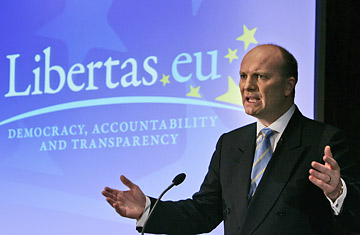
Declan Ganley, chairman of the Libertas party
In his two decade-long business career, Ireland's Declan Ganley, 40, has launched a telecoms firm, a timber trading company, a cable television operator, an online jewelry retailer and a finance house. But it is his latest venture that could end up having the biggest impact. In 2006 Ganley founded Libertas, a think tank that concentrated its scorn on the European Union. At the end of 2008 it became an E.U.-wide political party with the express aim of overhauling the institution it so often criticizes. "We are saddled with a tyranny of mediocrity," Ganley says. "It boggles the mind. Almost 80% of our laws now come from Brussels, and are drafted by unelected, unaccountable civil servants."
A self-made millionaire, Ganley plans to field Libertas candidates from all 27 E.U. member states in this June's European parliamentary elections. His party, he says, will bring change to Brussels. "We can really shake things up," he says. "We can send a message to Brussels for democracy, accountability and transparency in European governance." (See pictures of Obama's travels in Europe.)
Ganley maintains that the E.U.'s handling of the current economic crisis has been "dysfunctional" and that Europe's leaders haven't produced a roadmap for recovery. "I want Europe to work. I want it to face challenge of the day. But I don't want to leave it to this to cartel of politicians who aren't accountable to us at the ballot box."
That kind of attitude has long characterized so-called Euro-skepticism. But Ganley's money and political ambition has some rattled. Like other Euro MPs, British Liberal Democrat member of the European Parliament Andrew Duff dismisses Ganley as a rabble-rouser out for publicity. "It's utter balls to say he represents democracy," Duff says. "Scratch the surface and you'll discover he's a demagogue and a Europhobe." But Duff is also worried that Ganley could appeal to disgruntled European voters. "There is a real danger that this simplistic populism will strike a chord with voters that are profoundly uninformed about the E.U.," Duff says.
British-born, Ganley retains a London accent despite having lived in Ireland for 27 years. He talks fondly of his 97-year-old Irish grandmother who moved to Scotland to pick potatoes. Ganley created Libertas to campaign against the E.U.'s Lisbon Treaty — a so-far failed attempt to get countries to sign up to a re-write of a European Constitution — in Ireland's referendum last June. He is credited — or blamed — for the 'no' vote, and the subsequent institutional turmoil that continues to haunt the E.U.
Libertas ran a controversial campaign and has been accused of scaremongering: many voters thought — wrongly — that the treaty would introduce conscription into a European army and weaken Ireland's laws against abortion. The confusion also raised questions about whether the Lisbon Treaty was too complicated and technical to be put to a referendum. But Ganley, who will run himself in Ireland's northwest constituency, rejects such claims. "Democracy is not supposed to be perfect," he says. "It's a blunt instrument. It's not expected to be efficient."
With a personal fortune estimated at $300 million, Ganley has plenty of money to bankroll his new party. To hone his message, he has hired American Democratic campaign consultant Joe Trippi. Ganley talks of Libertas winning 70 seats in the 736-member European Parliament, more than enough to become a powerbroker between the other political groups. The only E.U.-wide poll, predict09.eu, suggests that Libertas could win a few seats but will fall well short of its stated goal.
The party's candidates are a mixed assortment: while he can boast of Latvia's former Prime Minister Guntars Krasts, he also has to cater for France's Philippe de Villiers, who heads the traditionalist Hunting, Fishing, Nature and Tradition (CPNT) parties. And Libertas is vague about its policies. Its website only lists a few slogans about opening up the E.U., and it has yet to unveil a manifesto. Apart from his attacks on the E.U.'s democratic deficit, Ganley has little to say about the issues that are most pressing in voters' minds, like jobs, economic recovery, and climate change.
Ganley has also faced questions about his own accountability and transparency, about his funding of Libertas in Europe, and his business links with the U.S. military. The European Parliament said last year that their own investigation found Ganley had signed contracts with the Pentagon worth about $200 million. Ganley's opponents claim his anti-E.U. stance reflects hiw connections with U.S. interests, a claim Ganley has always rejected.
"Europeans do not need a messiah to save them," says Pascale Joannin, general manager of the Paris-based Foundation Robert Schuman. "They want a program of clear policies and ideas to answer their concerns."
But can Libertas succeed? Joannin concedes it could exploit the voter gloom. "This is a period of uncertainty," she says. "We expect is a high rate of absenteeism in the European elections. We might think he is just a populist, but who knows how far he can go?"
